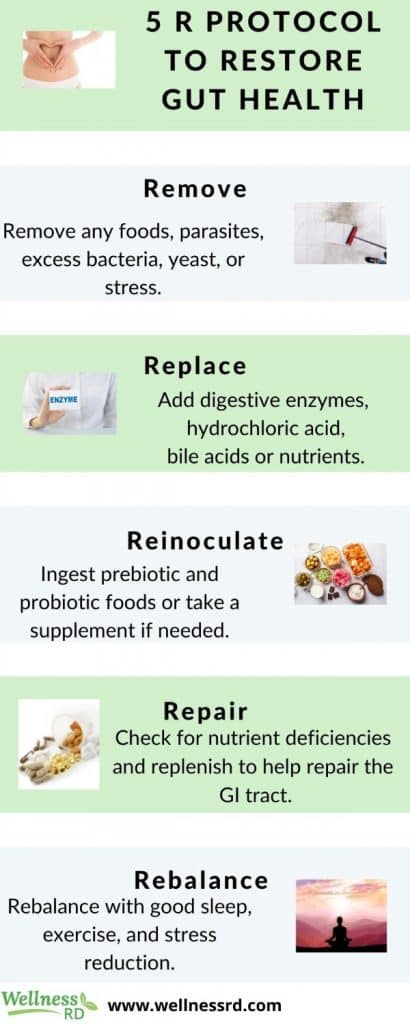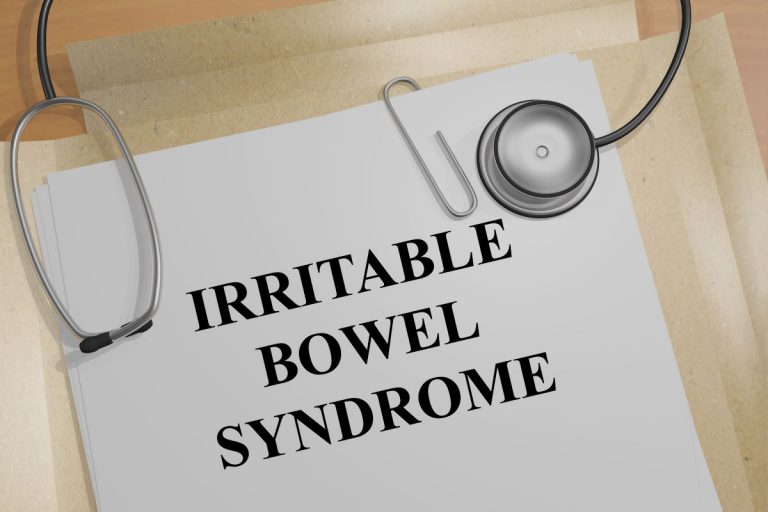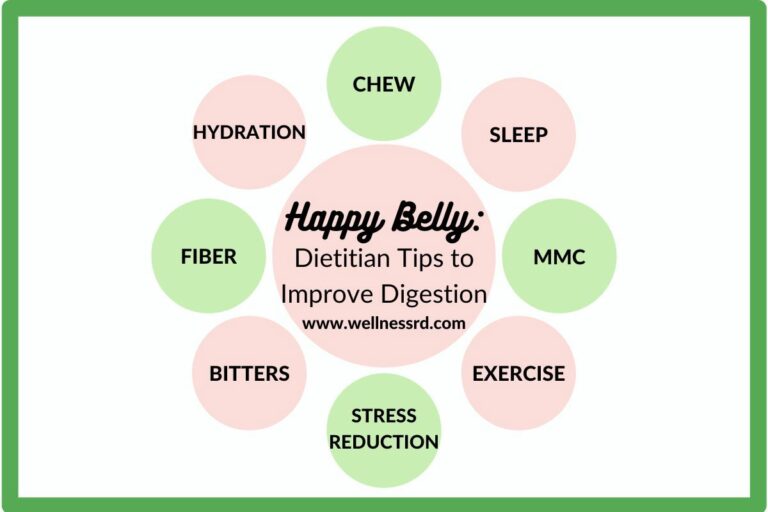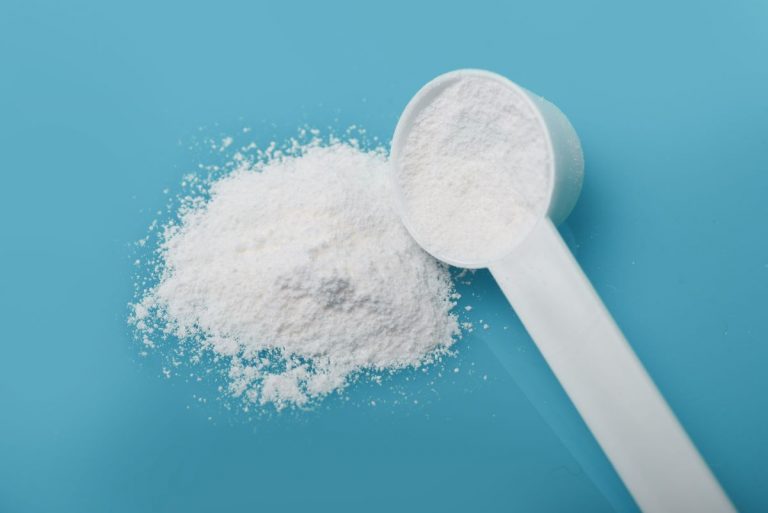HOW TO RESTORE YOUR GUT HEALTH NATURALLY
Do you suffer from gut problems? Are you trying to restore your gut health naturally?
Have you searched for the “right” diet or supplements to optimize your gut health?
We understand. It can be so confusing where to start.
In this comprehensive review, we will discuss a leaky gut and steps that may restore the gut naturally including nutrition, supplements, and lifestyle changes.
Let’s get started!
This information is for educational purposes only. As with any medical advice, always check with your doctor or health care professional for personal and age-appropriate recommendations.
Table of Contents
Your Digestive System
Process of Digestion
Let’s start with digestion.
First, digestion starts in the brain as you start to think about food and those digestive juices begin flowing…
The journey through the digestive tract involves several steps.
- Mouth chews food and enzymes are released such as lipase for fat digestion.
- Pharynx and the esophagus are where food propels down into the stomach.
- Stomach mixes food with gastric juices and protein begins to break down.
- Small intestine is the place of absorption of carbs, protein, fat, vitamins, minerals, and water.
- Other organs do their job next. The liver produces bile salts, the pancreas produces enzymes, and the gallbladder stores and releases bile.
- Lastly, the large intestine continues to break down food and absorb water, electrolytes, and vitamins (1)
What is the Gut Microbiome?
The gut microbiome contains both good and bad microbes (2).
Can you believe that the bacteria in the adult human gut are about the same weight as the brain (3)? That is a lot of bacteria!
According to many studies, a diverse gut microbiome is associated with better health. The good bacteria support your digestive health, immune system, mental health, and prevention of obesity (4).
What is a Leaky Gut (Intestinal Permeability)?
Intestinal Permeability
A leaky gut is when the lining of the gut is compromised and allows bacteria, toxins, and antigens into the bloodstream. If the gut lining is not healthy, this can trigger inflammation and symptoms.
Dr. Alessio Fasano has studied gut permeability and he has found that an imbalance of gut bacteria can influence the tight junctions in the gut. These tight junctions seal the gut and act as a barrier to the outside (5). Unbalanced bacteria (dysbiosis) are linked to many chronic inflammatory diseases.
You may have heard the term “All disease begins in the gut” by Hippocrates.
The gut has also been called the “second brain” as it produces neurotransmitters like our feel-good one serotonin. Your gut and brain are connected and influence each other.
For instance, if the gut is not healthy, there may be a change in neurotransmitter production which affects mood.
In addition, if our brain is stressed, it may not trigger the release of stomach juices to digest food. This is called the gut-brain connection.
Therefore, it is important to keep your gut healthy and gut bacteria balanced for overall health.
Symptoms of Leaky Gut
Some symptoms of a leaky gut may include gas, bloating, loose stools, weight loss, skin problems, fatigue, and mood changes. Symptoms may depend on the root cause.
Let’s look at some root causes.
What Causes Poor Gut Health?
Nutrient Deficiencies
A diverse diet rich in fruits, vegetables, and plant fibers can increase your gut bacteria (6, 7).
Lack of Prebiotic and Probiotic Foods
Prebiotics are a type of fiber that helps feed friendly gut bacteria (8). Some prebiotic foods are apples, asparagus, bananas, garlic, jerusalem artichokes, leeks, oats, and onions. These foods feed the good bacteria that support healthy digestion.
Probiotics that contain live bacteria are fermented foods such as kefir, kimchi, and sauerkraut.
Excess Alcohol
Overconsumption of alcohol has been linked to gut dysbiosis and associated changes in behavior (9). Excess alcohol promotes intestinal inflammation and can affect the gut-brain connection (10).
Sleep
Sleep is so important for whole body health. Lack of sleep can contribute to many chronic diseases.
Getting sub-optimal sleep can interrupt your “gut clock” just like it disrupts your circadian rhythm and may contribute to GI diseases like IBS (irritable bowel syndrome) or reflux (11, 12, 13).
Physical Activity
Exercise for 150 minutes per week is recommended for overall health (14). Did you know it is good for the gut too? Recent studies suggest aerobic exercise improves gut diversity (15, 16).
Stress
We discussed the gut-brain connection. If a person is stressed, it can alter the gut bacteria (17, 18, 19). Stress can play a role in GI disorders such as IBS (irritable bowel syndrome), reflux, and IBD (inflammatory bowel disease) like colitis and Crohn’s.
The 5 R Protocol to Restore Gut Health
Have you been diagnosed with IBS, reflux, Crohn’s, or ulcerative colitis?
What are the steps to restore gut health? The Institute of Functional Medicine has a 5 “R” Protocol which may restore the digestive tract. The 5 R protocol is a systematic way to reduce symptoms and improve gut health.
Remove
First, remove food that may be causing problems such as gluten, dairy, and processed foods. This is when an elimination diet such as the MRT test and LEAP protocol may be helpful (20).
We also want to remove anything that may be irritating the GI tract including parasites, overgrowth of bacteria, yeast, or H. pylori. A stool test is a tool to check for these irritants.
Stress also may play a role here so reducing stress by practicing mindfulness and deep breathing or vagal nerve exercise may be beneficial.
This step is when MRT food sensitivity testing and stool testing may be helpful.
Replace
Secondly, for proper digestion, we need adequate digestive enzymes, hydrochloric acid, and bile acids. These help to digest carbohydrates, protein, and fat.
Nutrient deficiencies may also be present. Check nutrient status with a micronutrient test and add nutrients like vitamin D, K, B12, magnesium, and zinc if needed.
Stool testing and micronutrient testing help to identify deficiencies.
Reinoculate
Thirdly, our goal is to expand the diet to create diversity. Eating about 40 different whole foods a week can accomplish this goal.
As we discussed earlier, adequate beneficial bacteria results in optimal gut health. Adding probiotic foods as well as supplements can help maintain good bacteria and prebiotic foods can feed the probiotics (21).
Stool testing analyzes gut health.
Repair
Next, this is when we want to repair the gut for long-term gut health. Ways to repair the gut lining may include adding zinc carnosine, antioxidants (Vitamins A, C, and E), and fish oil. Other supplements may include collagen, colostrum, glutamine, marshmallow, aloe vera, or slippery elm. Bone broth may also be beneficial.
Micronutrient testing evaluates nutrient needs.
Rebalance
Lastly, lifestyle choices are very important to maintain health. These include optimal sleep, exercise, stress reduction (mindfulness, deep breathing), and healthy relationships.
Try deep breathing, meditation, or yoga nidra.

Foods for a Healthy Gut- Which Foods Naturally Restore Your Gut?
Many nutrition programs restore the gut. Elimination diets can provide significant symptom relief however, it can be challenging to identify food sensitivities. Food sensitivities are a delayed food reaction so you may eat reactive foods today and symptoms may not show up for 72 hours.
The first step in an elimination diet is to remove gluten and dairy.
Next, the MRT (Mediator Release Test) provides a roadmap for your anti-inflammatory nutrition plan.
What is MRT and the LEAP Protocol?
MRT is a blood test that identifies sensitivity to 170 foods and chemicals by measuring mediators released from white blood cells. Mediators like cytokines, leukotrienes, and prostaglandins circulate after exposure to a reactive food and this can provoke inflammation. These reactions may cause symptoms like gut issues, fatigue, headaches, joint pain, eczema, or sinusitis.
You and your clinician will create the LEAP protocol (based on your results and medical history). This is your personalized anti-inflammatory nutrition plan.
Nutrition Recommendations to Keep Your Gut Healthy
- Eat a variety of foods- Try to include 40 different whole foods in your nutrition plan per week
- Include a rainbow of foods- a lot of colorful fruits, vegetables, and beans to provide healthy fiber
- Add polyphenols– these plant compounds (broccoli, blueberries, almonds, cocoa, green tea, grapes) provide beneficial microorganisms for the gut (22).
- Increase prebiotic foods to feed the probiotics
- Try fermented foods rich in healthy bacteria
How Long Does It Take to Restore the Gut Naturally?
Restoring the gut may take a few weeks to months. It all depends on the severity of your gut problems and your willingness to change your patterns.
Benefits of a Healthy Gut
A healthy gut promotes:
- Good digestion (23)
- A strong immune system (24)
- Brain health (25)
- Better mood (26)
- Beneficial sleep (27)
Final Thoughts
In conclusion, a diverse gut microbiome results in better health. A healthy gut supports your digestive health, immune system, mental health, and prevention of obesity.
Nutrient deficiencies, lack of prebiotics/probiotic foods, excess alcohol, poor sleep, inadequate exercise, and stress can affect gut health.
A gut restoration protocol includes removing, replacing, reinoculating, repairing, and rebalancing the gut.
Nutrition recommendations for a healthy gut may include food sensitivity testing, eating a variety of foods to increase fiber diversity, and including prebiotics and probiotics.
Remember, what you eat is important for health and disease prevention.
What you absorb (breaking down the food) and assimilate (getting into the cells) is critical.
Test don’t guess.
Contact me to schedule an appointment to review your gut health.






